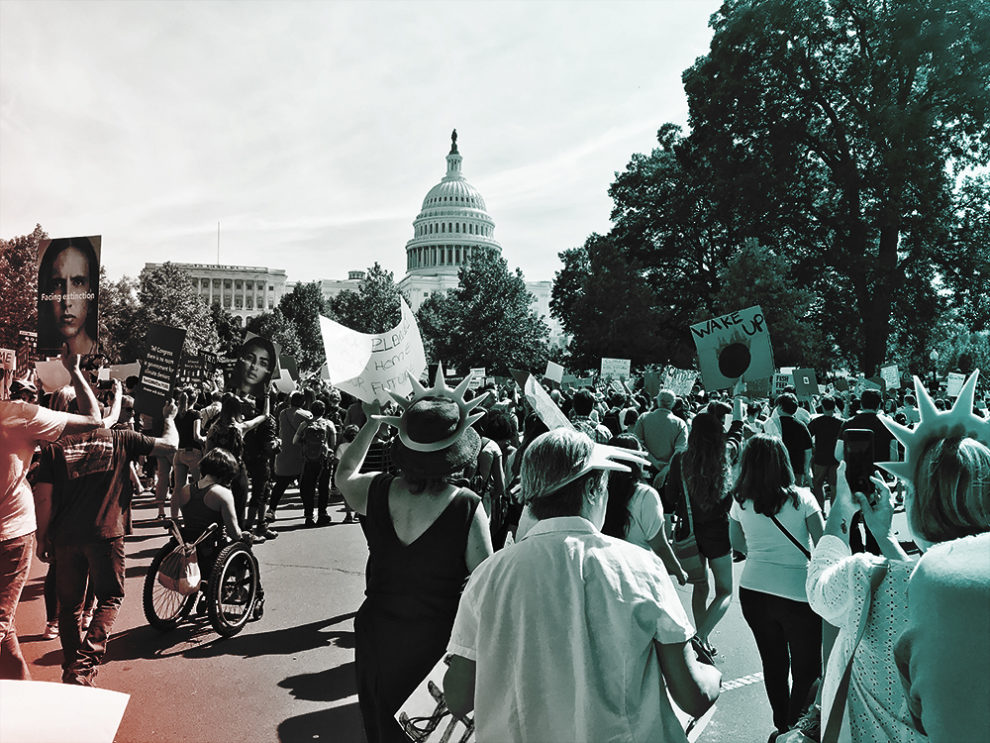
“Come gather ’round, people
Wherever you roam
And admit that the waters
Around you have grown
And accept it that soon
You’ll be drenched to the bone
If your time to you is worth savin’
And you better start swimmin’
Or you’ll sink like a stone
For the times they are a-changin’…”
Bob Dylan,
The Times They Are a-Changin’
In late October, The Guardian reported that climate activist Greta Thunberg declined the Nordic Council Environment Prize, telling the panel that climate doesn’t need prizes. Clear-eyed and unapologetic, Thunberg is the poster(child) of a generation fed up with inaction. In her own way, Thunberg reminds me of Bob Dylan. Equal parts dissident and troubadour, Dylan’s music became emblematic of the civil rights and antiwar movements of the 1960s just as Thunberg has come to represent the youth climate movement.
Bob Dylan’s epic protest song The Times They Are a-Changin’ kept playing in my head as I clicked through footage from the September 20th Climate Strike that drew massive crowds in every major city around the world. It is estimated that up to 4 million people took part in 2,500 events in 163 countries. [1] At many American high schools, students walked away from their desks, while in the workplace, adults stepped away from their keyboards and cubicles to do the same; the present and the future alongside each other in an urgent march of equal parts hope and impatience.
As a research consultancy supporting the energy industry, ILLUME sees the critical role utilities play in building a cleaner, safer, and more resilient energy infrastructure—and ultimately, healthier and more sustainable communities. We are proud to be part of an industry where many of our clients are taking bold steps towards climate mitigation by enabling customers to tap into zero-carbon sources of electricity. We have watched closely as some of the largest utilities in the country: Xcel, DTE Energy, Duke Energy, and others move towards zero-carbon by 2050. Our take? The September 20th Climate Strike embodies the type of disruption we’re going to need to save the planet. So, in this month’s blog, we share our observations (and pictures) from many of ILLUME’s employees who participated in, and documented, the Climate Strikes in Arizona, Oregon, Wisconsin, and Washington, D.C.
Madison, WI

In Wisconsin’s capital city, Climate Rally attendance was estimated in the thousands as high school students, college students, and others gathered downtown demanding action, waving signs that read, ‘Make Love, not CO2’ and ‘Save our Home.’
Members from ILLUME’s home office in Madison walked alongside the procession, which ended at the Capitol building on Mifflin Street. Eileen Hannigan, a Principal at ILLUME who attended the Climate Strike, said, “Seeing the crowds of both young (and the not-so-young) gives me hope that we will overcome the hurdles and stabilize our climate.”
Signs like “Protect the planet, Not profit!” and “There is no Planet B” channeled the urgency of the moment outside the offices of Madison Gas and Electric (MG&E). MG&E is on a path to reach net-zero carbon emissions by 2050, while Milwaukee’s WEC Energy Group aims to reduce carbon emissions by 80% by 2050. Why 2050? This is the date set by the Intergovernmental Panel on Climate Change (IPCC) to keep global temperatures from rising above 1.5 degrees Celsius. Should warming exceed that target, this would lead to, “irreversible loss of the most fragile ecosystems, and crisis after crisis for the most vulnerable people and societies.” [2]
On the capitol lawn, local artist Victor Castro created a dramatic display by draping sheets chronicling the rise of carbon in the atmosphere. Again, ILLUME’s Hannigan, “It was a chilling reminder of the challenges we face. We lack a national climate policy, but events like this and the actions of local governments and utilities show that we have the will to face the challenges and secure our future.”
Hopefully, we won’t have to wait too long to see the results. Recently, Wisconsin Governor Tony Evers announced a climate task force, led by Lt. Governor Mandela Barnes, that will include representatives from universities, industry, and agriculture to tackle this existential threat.
Tucson, AZ
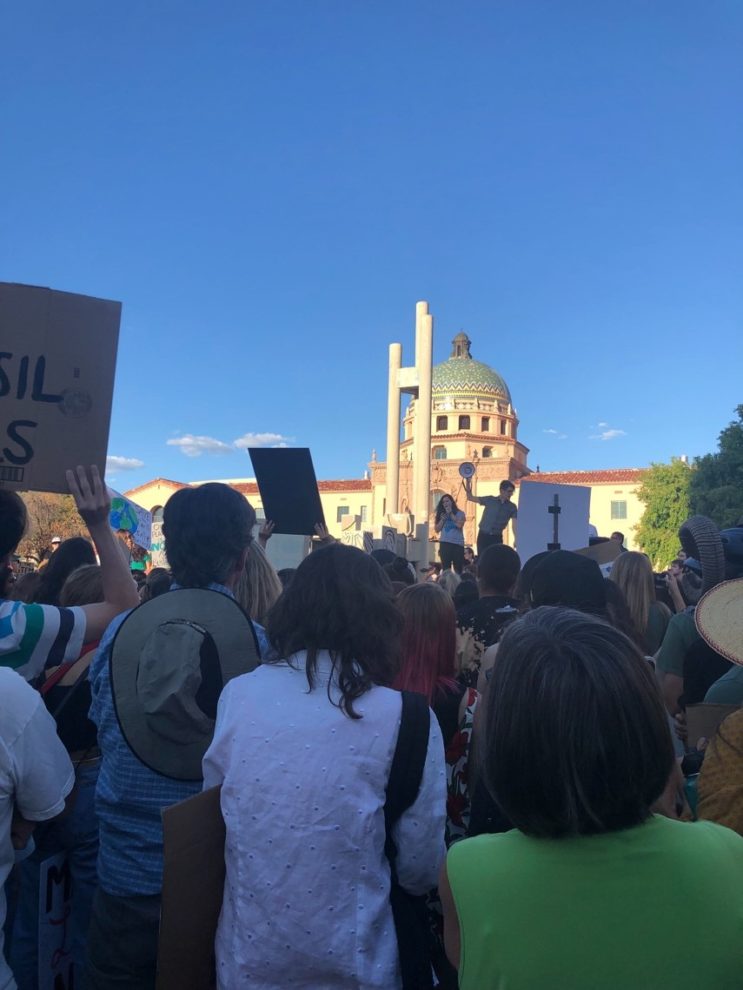
In Arizona’s second-largest city, several members from ILLUME’s Tucson office attended the Climate Rally held at Presidio Park, right across from City Hall and a stone’s throw away from the original Presidio (Spanish for ‘fort’) established in 1775. The event, organized by a local chapter of the Arizona Youth Climate Strike, was a diverse gathering of professionals, college students, families, and community activists. It was an emotional roller coaster that ebbed and flowed from anger to incredulity, to pride and optimism.
Staged on literally every corner, news crews interviewed event participants (many of them parents and grandparents) who spoke of the need for more environmental stewardship on the part of legislators to ensure the next generation does not inherit an uninhabitable planet.
Anne Dougherty, ILLUME Founder and Co-Owner, was in the crowd at the Tucson Climate Rally. “It is hard to explain the feeling of urgency I have now that my own kid is terrified of climate change,” said Dougherty. “In the way that I was afraid of nuclear war during the end of the cold war, my daughter is afraid of a destabilized planet and an environment where the things she loves—her family, animals, her cats—will not be able to thrive. So we went to the march to share in that sense of urgency. She needed to see that she is not alone.”
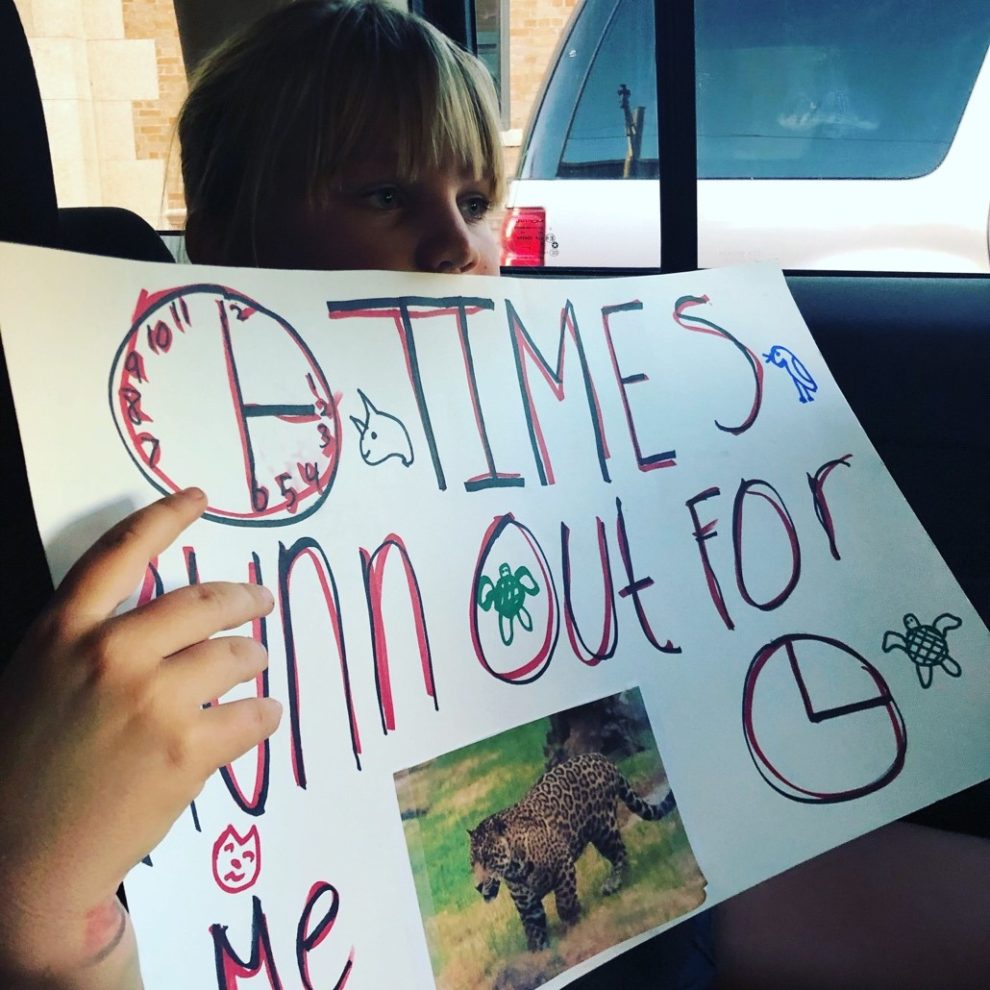
We couldn’t help but notice the kids! Hundreds of them tagging along next to their parents, free to roam about, but coming back every now and then to ask the occasional hard question or grab a familiar hand as the peaceful crowd swelled to several hundred. One child’s hand-drawn sign read, “Don’t Litter Our World.” The sign innocently written as only a child can, yet poignantly directed at adults.
Portland, OR

Portland’s Global Climate Strike was a highly organized, student-led effort that began around 10:30 a.m. and spanned from City Hall to Downtown, to Hawthorne Bridge to Portland’s Museum of Science and Industry. As with other climate rallies, youth were front and center, and (in true Portland fashion) the event featured a festival with a mix of art builds, film screenings, and food trucks.
Walking alongside the students was ILLUME’s own Jes Rivas, an engineer by education and an ILLUME Managing Director. Her observations of the protest were a mix of optimism and exasperation, echoes of what we consistently heard from folks who attended rallies across the country.
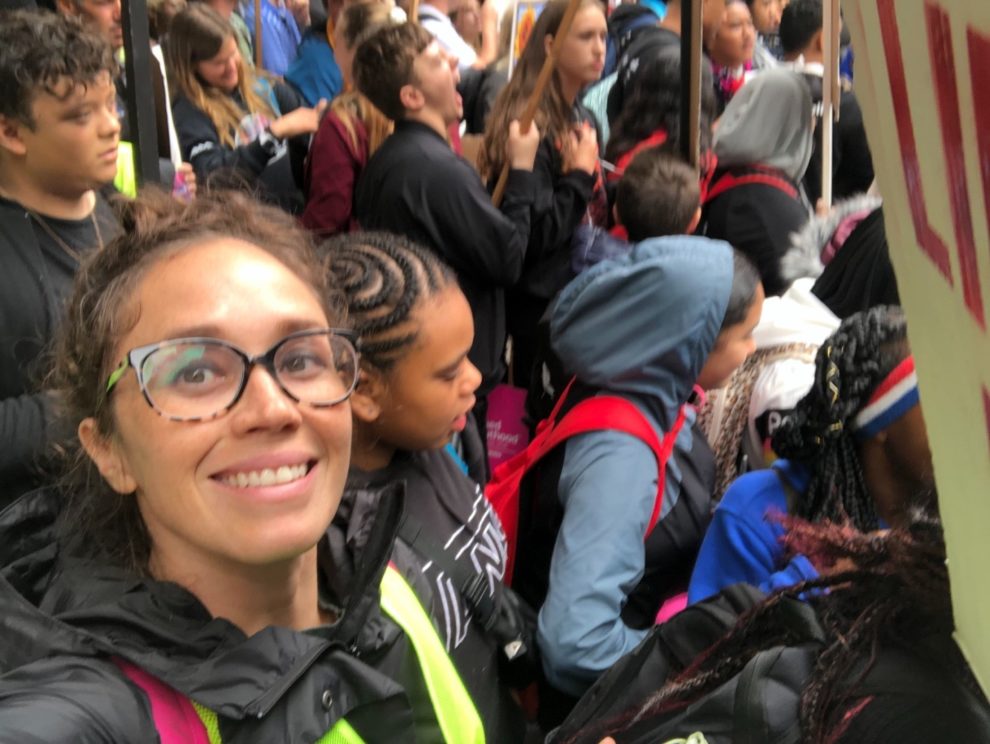
I was filled with both inspiration and frustration at the drive and turnout of youth at Portland’s parade. I’m so grateful for their passion, interest, and for the experience they’re gaining learning how to protest, assemble, and demand change. And I am also heartbroken at what we’ve forced them to fight for. Scrolling through Facebook, I came across a post from the march that read, “These kids are going to save the world.”
This was no casual observation. Youth protesters in Portland have their eyes on more immediate objectives, among them persuading local leaders to deny permits to Zenith Energy, which receives, ships, and stores Canadian tar sands crude.
According to the 350PDX Climate Strike page, the group demands Oregon’s version of a Green New Deal as well as an end to fossil fuels in the state. In addition to envisioning a future with “enlightened social, political, and economic systems prioritizing renewable energy use and increasing energy efficiency,” the organization seeks to create quality, family-wage jobs as part of a fossil-free economy. [3]
Washington, D.C.
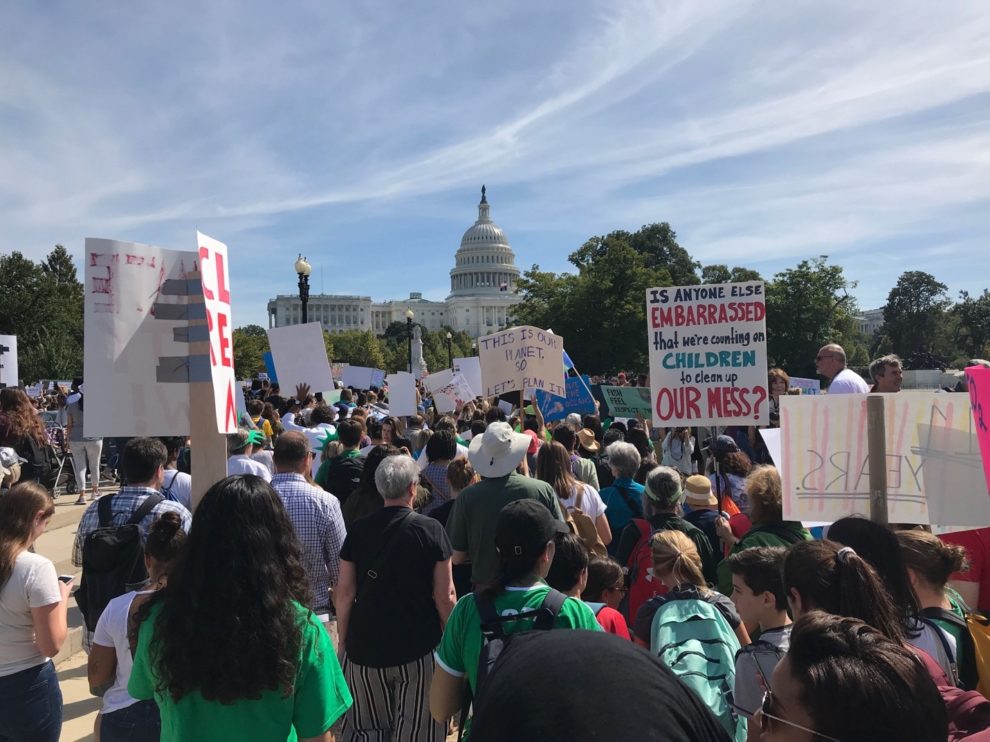
“Come senators, congressmen
Please heed the call
Don’t stand in the doorway
Don’t block up the hall
For he that gets hurt
Will be he who has stalled
The battle outside ragin’
Will soon shake your windows
And rattle your walls
For the times, they are a-changin.”
Liz Kelley, ILLUME Technical Director for Qualitative Research, spent the afternoon at our nation’s capital capturing the moment as high school senior Nadia Nazar, co-founder of Zero Hour, an organization of young activists working through a crisis that they had no hand in creating, stood in front of a crowd of thousands and demanded her elected officials do better. I was so inspired and awestruck by Nazar’s comments on C-SPAN that I fired off a series of Google searches: “How old is Nadia Nazar?” “Nadia Nazar speaks at…” “Where is Nadia Nazar going to college?” As a parent of a high schooler, I was floored.
Back to the scene in D.C., Nadia and her fellow students articulated their demands as the event was simultaneously broadcast on C-SPAN and Facebook Live. From passing the Green New Deal, to respecting indigenous rights and treaties, to ensuring environmental justice for all—the group cited their positions one by one. They rallied the crowd, and as members of Congress watched from behind the podium, kids took over the microphone, making no apologies.
In what resembled a high school pep rally that could have easily devolved into a roast of Congress, a member of Zero Hour introduced the first speaker as the crowd cheered. First up was Massachusetts’ Representative Jim McGovern who addressed the obvious as he launched into a series of mea culpas that began with, “Let me tell you what is not right.”
(Off in the distance, a sign bouncing up and down in the crowd read, “Is anyone else embarrassed that we’re counting on children to clean up our mess?”). McGovern continued. “It is not right that you have to be out here in the first place…It is not right that you have to sacrifice your education because the so-called adults here in Washington don’t take this climate crisis seriously.”
We asked Liz Kelley, an experienced ethnographer, to walk us through her impression of the D.C. Climate Strike. Liz began by first acknowledging our unique vantage point as researchers in the energy industry. “Participating was a galvanizing reminder of the stakes of the work we do.”
She added, “There was a palpable energy and urgency in the air…Being in front of the Capitol, the calls for lawmakers to take action were poignant, in part because it appeared so few were listening…The speakers at the event, including members of the Lakota and Standing Rock Tribes, among other indigenous Americans, called attention to the intersecting and linked oppressions that impact indigenous communities and communities of color across the world more harshly; their calls for a decolonized future were inspiring.”
“The line it is drawn
The curse it is cast
The slow one now
Will later be fast
As the present now
Will later be past
The order is rapidly fadin’
And the first one now
Will later be last
For the times, they are a-changin’.”
As we debriefed the Climate Strike events, we couldn’t escape the one nagging question: Who is the adult in the room? We must channel our collective guilt from Greta Thunberg’s rebuke of adults during her talk at the United Nations and use it as a second chance to create a framework to weather the disruptions ahead. When it comes to our children, the stakes are too big to be on the wrong side of history.






